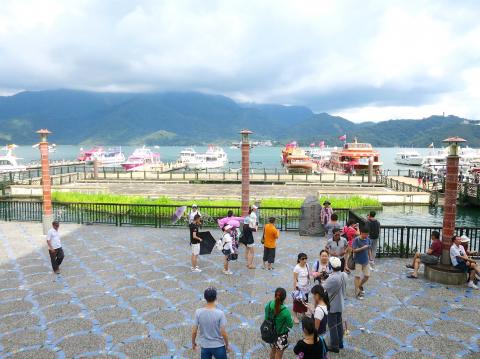The Executive Yuan has approved a plan to extend NT$30 billion (US$952 million) in loans to the tourism sector, which has felt the pinch after a fall in the number of Chinese visitors this year.
The Cabinet said that the loans are aimed at helping domestic tourism businesses upgrade their hardware and software in a bid to improve the quality of the industry and eventually attract more visitors to the nation.
Since the Democratic Progressive Party government took office on May 20, there has been a 30 percent year-on-year decline in the number of Chinese tourists taking part in group tours amid cooling cross-strait ties.

Photo: Liu Pin-chuan, Taipei Times
The number of Chinese visitors was down 15.03 percent year-on-year in July, after falling about 12 percent in May and June.
According to the Hotel Association of the Republic of China (Taiwan), the hotel occupancy rate has dropped by 50 percent, with those in central, southern and eastern Taiwan the hardest-hit.
In addition, the National Joint Association of Buses for Tourists of the Republic of China (Taiwan) said that about 80 percent of a total of 16,000 tourist buses in the nation are idle.
The plunge has caused an outcry from the tourism industry, which has urged the government to provide financial assistance to help companies survive the steep decline.
Members of the tourism industry are planning to stage a demonstration on Monday.
The loans are to be made available to businesses under set circumstances defined by the National Development Council, Executive Yuan spokesman Tung Chen-yuan (童振源) said, adding that the loans are not a form of financial relief.
According to the council’s Guiding Principles on Preferential Loans to Aid the Upgrades of the Tourism Industry (獎勵觀光產業升級優惠貸款要點), companies applying for the loans must use the funding to upgrade their hardware and software to offer better quality tourism.
The Executive Yuan said it would also encourage more Taiwanese to tour the nation and make up for the shortfall in Chinese visitors, while the government would continue in its efforts to diversify the sources of foreign visitors.
The Executive Yuan said that it would help the tourism industry come up with innovative tour packages providing an insightful look at the nation, including its unique cultures, to lure more foreign tourists.
Additional reporting by Lee Hsin-fang

ACTION PLAN: Taiwan would expand procurement from the US and encourage more companies to invest in the US to deepen bilateral cooperation, Lai said The government would not impose reciprocal tariffs in retaliation against US levies, President William Lai (賴清德) said yesterday, as he announced five strategies to address the issue, including pledging to increase Taiwanese companies’ investments in the US. Lai has in the past few days met with administrative and national security officials, as well as representatives from various industries, to explore countermeasures after US President Donald Trump on Wednesday last week announced a 32 percent duty on Taiwanese imports. In a video released yesterday evening, Lai said that Taiwan would not retaliate against the US with higher tariffs and Taiwanese companies’ commitments to

Intelligence agents have recorded 510,000 instances of “controversial information” being spread online by the Chinese Communist Party (CCP) so far this year, the National Security Bureau (NSB) said in a report yesterday, as it warned of artificial intelligence (AI) being employed to generate destabilizing misinformation. The bureau submitted a written report to the Legislative Yuan in preparation for National Security Bureau Director-General Tsai Ming-yen’s (蔡明彥) appearance before the Foreign Affairs and National Defense Committee today. The CCP has been using cognitive warfare to divide Taiwanese society by commenting on controversial issues such as Taiwan Semiconductor Manufacturing Co’s (TSMC, 台積電) investments in the

‘SPECIAL CHANNEL’: Taipei’s most important tasks are to stabilize industries affected by Trump’s trade tariffs and keep negotiations with Washington open, a source said National Security Council Secretary-General Joseph Wu (吳釗燮) arrived in the US for talks with US President Donald Trump’s administration, a source familiar with the matter said on Friday. Wu was leading a delegation for a meeting known as the “special channel,” the Financial Times reported earlier. It marked Trump’s first use of the channel since returning to the White House on Jan. 20. Citing a source familiar with the matter, the Financial Times reported that Minister of Foreign Affairs Lin Chia-lung (林佳龍) was also a part of the delegation. The visit came days after China concluded war games around Taiwan and amid Trump’s

HELPING HAND: The steering committee of the National Stabilization Fund is expected to hold a meeting to discuss how and when to utilize the fund to help buffer the sell-off The TAIEX plunged 2,065.87 points, or 9.7 percent, to close at 19,232.35 yesterday, the highest single-day percentage loss on record, as investors braced for US President Donald Trump’s tariffs after an extended holiday weekend. Amid the pessimistic atmosphere, 945 listed companies led by large-cap stocks — including Taiwan Semiconductor Manufacturing Co (TSMC, 台積電), Hon Hai Precision Industry Co (鴻海精密) and Largan Precision Co (大立光) — fell by the daily maximum of 10 percent at the close, Taiwan Stock Exchange data showed. The number of listed companies ending limit-down set a new record, the exchange said. The TAIEX plunged by daily maxiumu in just